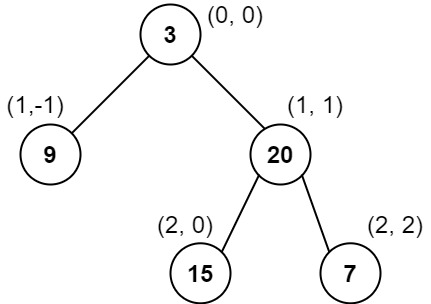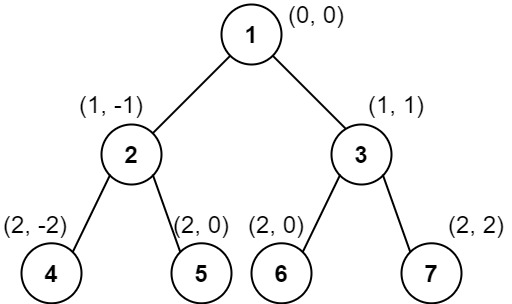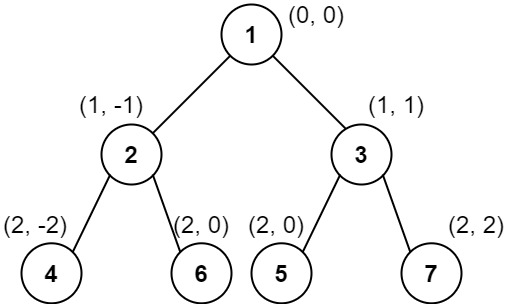C++
Java
Python
Python3
C
C#
JavaScript
Ruby
Swift
Go
Scala
Kotlin
Rust
PHP
TypeScript
Racket
Erlang
Elixir
Dart
monokai
ambiance
chaos
chrome
cloud9_day
cloud9_night
cloud9_night_low_color
clouds
clouds_midnight
cobalt
crimson_editor
dawn
dracula
dreamweaver
eclipse
github
github_dark
gob
gruvbox
gruvbox_dark_hard
gruvbox_light_hard
idle_fingers
iplastic
katzenmilch
kr_theme
kuroir
merbivore
merbivore_soft
mono_industrial
nord_dark
one_dark
pastel_on_dark
solarized_dark
solarized_light
sqlserver
terminal
textmate
tomorrow
tomorrow_night
tomorrow_night_blue
tomorrow_night_bright
tomorrow_night_eighties
twilight
vibrant_ink
xcode
上次编辑到这里,代码来自缓存 点击恢复默认模板
/**
* Definition for a binary tree node.
* struct TreeNode {
* int val;
* TreeNode *left;
* TreeNode *right;
* TreeNode() : val(0), left(nullptr), right(nullptr) {}
* TreeNode(int x) : val(x), left(nullptr), right(nullptr) {}
* TreeNode(int x, TreeNode *left, TreeNode *right) : val(x), left(left), right(right) {}
* };
*/
class Solution {
public:
vector<vector<int>> verticalTraversal(TreeNode* root) {
}
};
运行代码
提交
golang 解法, 执行用时: 0 ms, 内存消耗: 2.6 MB, 提交时间: 2023-06-13 10:00:47
/**
* Definition for a binary tree node.
* type TreeNode struct {
* Val int
* Left *TreeNode
* Right *TreeNode
* }
*/
type data struct{ col, row, val int }
func verticalTraversal(root *TreeNode) (ans [][]int) {
nodes := []data{}
var dfs func(*TreeNode, int, int)
dfs = func(node *TreeNode, row, col int) {
if node == nil {
return
}
nodes = append(nodes, data{col, row, node.Val})
dfs(node.Left, row+1, col-1)
dfs(node.Right, row+1, col+1)
}
dfs(root, 0, 0)
sort.Slice(nodes, func(i, j int) bool {
a, b := nodes[i], nodes[j]
return a.col < b.col || a.col == b.col && (a.row < b.row || a.row == b.row && a.val < b.val)
})
lastCol := math.MinInt32
for _, node := range nodes {
if node.col != lastCol {
lastCol = node.col
ans = append(ans, nil)
}
ans[len(ans)-1] = append(ans[len(ans)-1], node.val)
}
return
}
python3 解法, 执行用时: 52 ms, 内存消耗: 16.3 MB, 提交时间: 2023-06-13 10:00:26
# Definition for a binary tree node.
# class TreeNode:
# def __init__(self, val=0, left=None, right=None):
# self.val = val
# self.left = left
# self.right = right
class Solution:
def verticalTraversal(self, root: TreeNode) -> List[List[int]]:
nodes = list()
def dfs(node: TreeNode, row: int, col: int) -> None:
if not node:
return
nodes.append((col, row, node.val))
dfs(node.left, row + 1, col - 1)
dfs(node.right, row + 1, col + 1)
dfs(root, 0, 0)
nodes.sort()
ans, lastcol = list(), float("-inf")
for col, row, value in nodes:
if col != lastcol:
lastcol = col
ans.append(list())
ans[-1].append(value)
return ans
java 解法, 执行用时: 3 ms, 内存消耗: 40.5 MB, 提交时间: 2023-06-13 09:59:55
/**
* Definition for a binary tree node.
* public class TreeNode {
* int val;
* TreeNode left;
* TreeNode right;
* TreeNode() {}
* TreeNode(int val) { this.val = val; }
* TreeNode(int val, TreeNode left, TreeNode right) {
* this.val = val;
* this.left = left;
* this.right = right;
* }
* }
*/
// dfs + 哈希表 + 排序
class Solution {
Map<TreeNode, int[]> map = new HashMap<>(); // col, row, val
public List<List<Integer>> verticalTraversal(TreeNode root) {
map.put(root, new int[]{0, 0, root.val});
dfs(root);
List<int[]> list = new ArrayList<>(map.values());
Collections.sort(list, (a, b)->{
if (a[0] != b[0]) return a[0] - b[0];
if (a[1] != b[1]) return a[1] - b[1];
return a[2] - b[2];
});
int n = list.size();
List<List<Integer>> ans = new ArrayList<>();
for (int i = 0; i < n; ) {
int j = i;
List<Integer> tmp = new ArrayList<>();
while (j < n && list.get(j)[0] == list.get(i)[0]) tmp.add(list.get(j++)[2]);
ans.add(tmp);
i = j;
}
return ans;
}
void dfs(TreeNode root) {
if (root == null) return ;
int[] info = map.get(root);
int col = info[0], row = info[1], val = info[2];
if (root.left != null) {
map.put(root.left, new int[]{col - 1, row + 1, root.left.val});
dfs(root.left);
}
if (root.right != null) {
map.put(root.right, new int[]{col + 1, row + 1, root.right.val});
dfs(root.right);
}
}
}
javascript 解法, 执行用时: 72 ms, 内存消耗: 43.1 MB, 提交时间: 2023-06-13 09:59:05
/**
* Definition for a binary tree node.
* function TreeNode(val, left, right) {
* this.val = (val===undefined ? 0 : val)
* this.left = (left===undefined ? null : left)
* this.right = (right===undefined ? null : right)
* }
*/
/**
* @param {TreeNode} root
* @return {number[][]}
*/
var verticalTraversal = function(root) {
let res=[];
const stack = []
//前序遍历(迭代)
if(root) stack.push([root,0,0])
while (stack.length) {
const n = stack.pop()
let node=n[0];
let row=n[1];
let col=n[2];
res.push([node.val,row,col]);
if(node.right) stack.push([node.right,row+1,col+1])
if(node.left) stack.push([node.left,row+1,col-1])
}
//排序
res.sort((v1,v2)=>v1[2]-v2[2]||v1[1]-v2[1]||v1[0]-v2[0])
//合并
let result=[[res[0][0]]];
for(let i=1;i<res.length;i++){
if(res[i][2]!==res[i-1][2]){
result.push([res[i][0]]);
}else{
result[result.length-1].push(res[i][0])
}
}
return result
};


